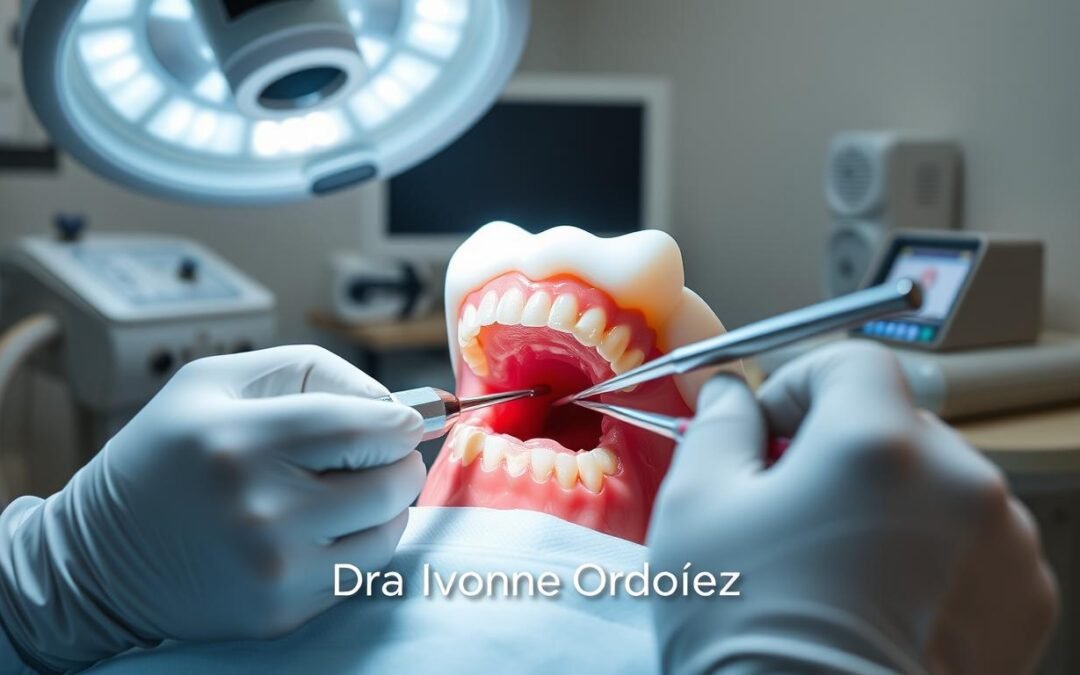Your dentist may suggest seeing an endodontist for complex dental issues. This referral process is vital for your dental health. Understanding the journey can ease worries and improve results.
I felt nervous when told I needed a root canal. Learning about the procedure and referral reasons calmed my fears. The process ensures you get the best care for tricky dental problems.
Endodontists are tooth-saving experts with advanced training. They perform complex procedures with great skill. A referral to an endodontist means you’ll get specialized care for a healthy smile.
Key Takeaways
- Endodontic referrals are common for complex root canal treatments
- The process ensures you receive specialized care for tooth-saving procedures
- Understanding the referral steps can reduce anxiety about the treatment
- Endodontists have advanced training in root canal procedures
- Referrals often lead to better outcomes for complex dental issues
Understanding the Need for Endodontic Referrals
Dental referrals to root canal specialists are common for complex tooth issues. Many patients benefit from these specialized treatments. Let’s explore why you might need an endodontist and their expertise’s advantages.
Signs You Might Need Root Canal Treatment
Spotting early signs of tooth infection is vital. Severe tooth pain, sensitivity to temperature, or swollen gums may indicate a root canal need.
Why General Dentists Refer to Endodontists
General dentists often refer complex cases to endodontists. These experts save teeth and diagnose infections with advanced training and specialized equipment.
Benefits of Seeing a Root Canal Specialist
Root canal specialists offer several advantages. They have deep knowledge of tooth anatomy and use cutting-edge technology.
Their expertise often leads to more efficient procedures and better outcomes. Endodontists are also skilled in managing dental pain for a more comfortable experience.
- Advanced techniques for tooth infection diagnosis
- Specialized equipment for precise treatment
- Greater expertise in complex root canal cases
- Improved pain management during procedures
Knowing about endodontic referrals can ease concerns about seeing a specialist. The main goal is saving your natural tooth and restoring oral health.
Referral Process for Endodontics: Step-by-Step Guide
Let’s explore the endodontic referral process. This guide will help ease your dental pain management concerns. We’ll break down the steps for seeking an endodontist referral. First, talk to your regular dentist about your dental pain and ask for a referral to an endodontist. They will be able to recommend a trusted specialist who can help diagnose and treat your issue. Once you have a referral, be sure to check with your insurance provider to understand your Endodontic insurance coverage and any out-of-pocket costs you may incur. This will help you plan for your treatment and avoid any unexpected expenses.

Your general dentist starts by recommending an endodontist. They’ll give you a referral form and the specialist’s contact details. You’ll then schedule your appointment, with some offices offering WhatsApp booking.
Gather your dental records and X-rays before your visit. The endodontist’s office might ask for these in advance. Bring your ID, insurance info, and medication list on appointment day.
| Step | Action | Responsibility |
|---|---|---|
| 1 | Receive referral from general dentist | Patient |
| 2 | Contact endodontist office | Patient |
| 3 | Schedule appointment | Patient/Endodontist Office |
| 4 | Gather necessary documents | Patient |
| 5 | Attend appointment | Patient |
The endodontist will review your case during your visit. They’ll examine you and discuss treatment options. Your dental pain concerns will be addressed, and next steps outlined.
Preparing for Your First Endodontist Appointment
Feeling ready for my first endodontist visit eases my worries. Being prepared makes a big difference. Let’s explore what I need before my Root Canal Treatment.
Necessary Medical Records and Documentation
I’ll collect my dental records and recent X-rays. My medical history and list of medications are key. These help the endodontist plan my treatment well.
I’ll also bring my insurance information. This helps with any coverage questions.
Questions to Ask Your Endodontist
I’ve made a list of questions about my Root Canal Treatment:
- How long will the procedure take?
- What’s the recovery process like?
- Are there any risks I should know about?
- How many appointments will I need?
What to Bring to Your Appointment
I’ll pack a small bag with:
- My ID and insurance card
- A list of current medications
- Any referral forms from my general dentist
- A notepad for jotting down information
Being ready helps me feel calm about my Endodontic Procedure. It sets the stage for a smooth first visit.
Comprehensive Endodontic Examination and Diagnosis
An endodontist’s thorough exam determines if I need root canal therapy. They review my dental history and symptoms first. This helps them understand my situation and guide their approach.
The specialist performs tests to assess my tooth’s condition. These may include percussion, cold, electric pulp, and periodontal probing tests.
- Percussion test: Tapping on the tooth to check for sensitivity
- Cold test: Applying cold stimulus to evaluate nerve response
- Electric pulp test: Using a small electric current to test nerve vitality
- Periodontal probing: Measuring gum pocket depth around the tooth
Imaging is crucial in tooth infection diagnosis. X-rays reveal hidden decay, bone loss, and root structure. 3D cone beam CT scans offer detailed views in complex cases.
| Diagnostic Tool | Purpose | Information Provided |
|---|---|---|
| Digital X-rays | Visualize tooth structure | Decay, bone loss, root anatomy |
| 3D CBCT Scan | Detailed 3D imaging | Complex root systems, bone defects |
| Pulp Vitality Tests | Assess nerve health | Tooth sensitivity, nerve damage |
These diagnostic tools help the endodontist decide if root canal therapy is needed. This thorough approach ensures I get the best treatment for my dental issue.
Advanced Endodontic Procedures and Treatments
Endodontics has made great strides recently. New procedures and treatments make Root Canal Treatment more effective and comfortable. Let’s explore these exciting advancements together.
Root Canal Therapy: What to Expect
Root Canal Treatment is simpler than you might think. I start by numbing the area. Then, I make a small opening in the tooth.
Next, I remove infected pulp and clean the canals. I fill them with special material and seal the tooth. A crown protects the treated tooth.
Innovative Techniques in Endodontics
New tech has changed endodontics for the better. Microscopes give me better visibility and precision. 3D imaging helps plan treatments more accurately.
Laser-assisted procedures can speed up the process. They also make it less invasive for patients.
Pain Management During and After Treatment
Dental Pain Management is crucial. Local anesthesia keeps you comfy during treatment. After, over-the-counter pain relievers usually work well.
Sometimes, I might prescribe stronger meds. Most patients have little discomfort and recover quickly.
| Pain Management Method | During Treatment | After Treatment |
|---|---|---|
| Local Anesthesia | Yes | No |
| Over-the-counter Pain Relievers | No | Yes |
| Prescription Pain Medication | No | Sometimes |
Follow-up Care and Communication with Your General Dentist
Proper follow-up care is vital for a successful recovery after endodontic treatment. I’ll guide you through what to expect during your post-treatment phase. Your endodontist will provide detailed instructions for at-home care.

- Pain management techniques
- Eating restrictions
- Oral hygiene practices
Follow these guidelines carefully to ensure proper healing. Your endodontist will schedule follow-up appointments to monitor your progress. They’ll send a detailed report of your treatment to your general dentist.
You’ll return to your general dentist about two weeks after your root canal treatment. They’ll assess your recovery and may place a permanent crown to protect your treated tooth.
Regular check-ups with your general dentist are essential for your overall oral health. They’ll monitor the treated tooth during routine visits, ensuring long-term success of your endodontic treatment.
Choosing the Right Endodontist for Your Needs
Finding the right endodontist is crucial for root canal treatment. I focus on qualifications and experience first. Board certification and years of practice reveal their expertise level.
Patient reviews offer insights into bedside manner and treatment outcomes. I ask my dentist for recommendations on specialists with great track records.
Up-to-date technology and techniques are essential for successful treatment. I ensure the endodontist uses modern methods for the best results.
Some people travel abroad for endodontic care, like to Colombia. This option offers high-quality treatments at lower costs. However, I prefer local care for easier follow-ups.
The most important factor is finding a trusted endodontist. This holds true whether they’re nearby or in another country.














